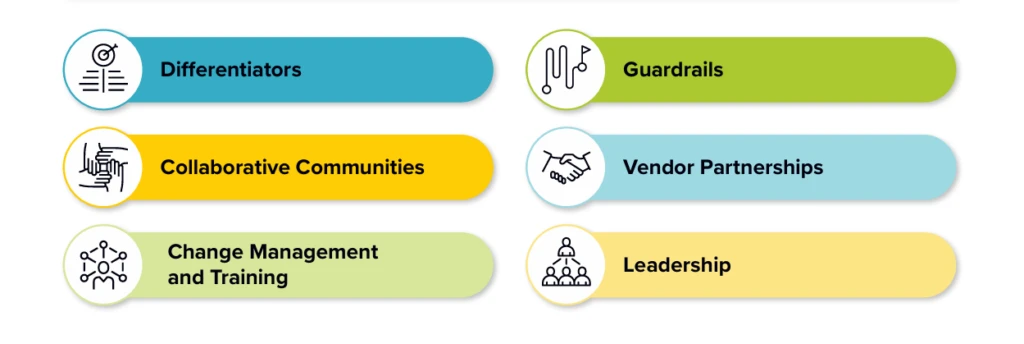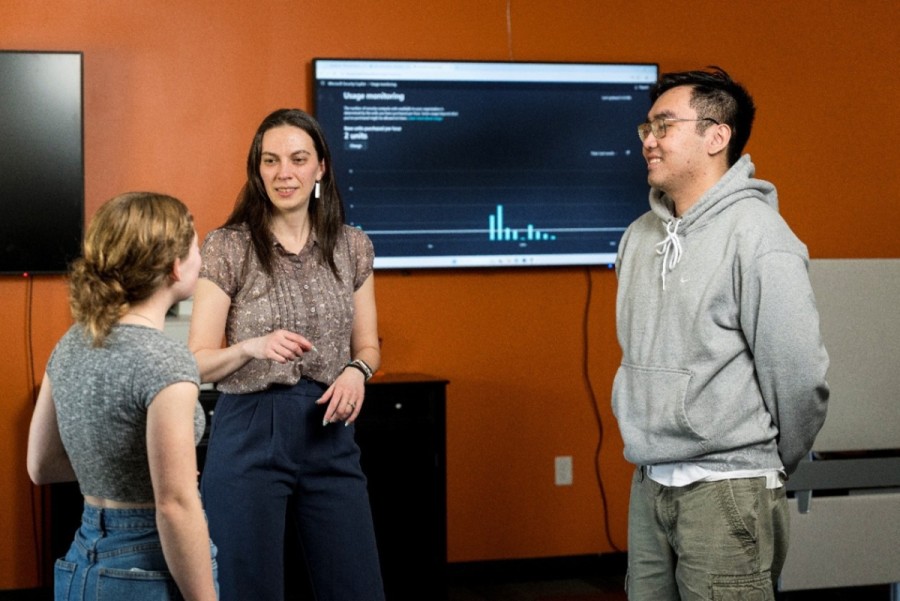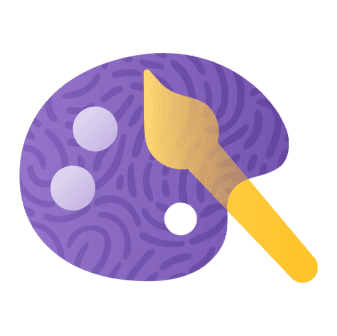Over the past few years, higher education institutions have been working across disciplines and departments to explore the transformative potential of AI. We’re consistently inspired by new examples of innovation each day, from the classroom to operations, which we’re excited to share here. We’ll also dive deeper into patterns of success through a new IDC White Paper, sponsored by Microsoft, A Blueprint for AI-Ready Campuses: Strategies from the Frontlines of Higher Education.1 IDC spoke with academic and IT leaders from four forward-looking institutions in the United States: Auburn University, Babson College, Georgia Tech, and the University of North Carolina (UNC) at Chapel Hill.
A blueprint for AI-ready campuses

IDC identified six common foundational characteristics of advanced AI strategies in Higher Education:
Differentiators – Rather than only focusing on AI-powered automation for efficiency and cost savings, institutions are identifying unique areas where AI can help differentiate and innovate. According to Michael Barker, Vice Chancellor for Information Technology and CIO at UNC, “Our goal is to use AI to enhance our research capabilities and make groundbreaking discoveries that highlight our strengths and differentiate us.”
Guardrails – Institutions are initially focusing on creating guidelines for responsible use and moving toward governance in parallel. Jill Albin-Hill, Deputy CIO of Auburn University, notes, “Our guidelines allow for flexibility and innovation while ensuring that ethical standards are upheld.”
Collaborative Communities – Fostering collaboration, a culture of experimentation, and knowledge sharing helps drive AI initiatives forward. Ruben Mancha, Associate Professor of Information Systems at Babson College, states, “At Babson College, our AI Generator group is a key driver of innovation, providing a platform for our community to collaborate, share best practices, and explore new AI applications.”
Vendor Partnerships – Partnering with a diverse set of technology vendors with advanced AI capabilities and offerings helps institutions access cutting-edge AI tools and expertise. For example, the white paper cites, “Georgia Tech’s AI strategy is deeply intertwined with its partnerships, particularly with major industry players such as Microsoft, OpenAI, and NVIDIA.”
Change Management and Training – Providing comprehensive, ongoing training programs to ensure that all stakeholders, at all levels of the institution, are comfortable and proficient with AI tools is essential. Dr. Asim Ali, Executive Director at Auburn University, remarks, “Our goal is to provide the best environment on campus for students, professional staff, and faculty to learn about different resources, tools, and ideas and to think critically about their impact on society.”
Leadership – Effective AI leadership requires both top-down and bottom-up, grassroots innovation. Christopher Clemens, Provost and Chief Academic Officer at UNC, says, “We want to set the example of what we want AI to do for our institution and give them the tools, skills, and encouragement they need to bring that vision to life.”

Recommendations for advancing AI strategy
The white paper also outlines critical strategic, organizational, process, and technological recommendations to shape and advance AI strategy in higher education. A few highlights include:
- Align AI investments with the institution’s broader strategic vision – Patty Patria, CIO of Babson College, noted, “We have intense interest and demand coming from all areas of the institution. So, we take care to work very closely with everyone to gather feedback, understand what their needs are, and build tools and solutions for them. AI is a strategic capability in our broader toolset to achieve our larger goals.”
- Invest in AI for all – democratize access to diverse AI tools by ensuring all have access to AI resources and innovation.
- Create a flexible and adaptive strategy – adopt an iterative approach, allowing for quick pivots and adjustments based on what works and what doesn’t.
- Measure impact and success – establish clear metrics to ensure alignment to institutional goals and delivery of desired outcomes.
- Foster inclusive decision-making and stakeholder engagement – encourage collaboration across departments, including those who may be skeptical of AI, and ensure that diverse perspectives are considered.
- Allow time and space for AI adoption – Pascal Van Hentenryck at Georgia Tech shared, “We need to balance the urgency of adopting AI with the need to provide a supportive environment where everyone can learn and experiment at their own pace.”
- Ensure AI-ready data – establishing a robust data management strategy is essential for effective AI implementation. As Leo Howell said, “Building strong data engineering teams is crucial for ensuring that our AI models are trained on high-quality, reliable data.”
- Prioritize privacy and security – implement data protection measures, ensure compliance, design AI systems that safeguard sensitive data from the outset.
Explore more insights from leading institutions
Enhancing learning, research, and operations with Microsoft 365 Copilot
The Kelley School of Business at Indiana University is exploring AI to advance business education, career services, and academic research. In an initial study, professors found that students using Microsoft 365 Copilot saw performance improve by 10% and time to complete the task at hand was reduced by 40%.2 Students felt that Copilot helped build confidence and prepare for their future careers. Career coaches agreed and have used Copilot Chat to provide more tailored guidance and spend more time engaging students on a one-to-one basis.
At Miami Dade College, leaders implemented AI-powered assistants through Microsoft Copilot Studio, which led to a 15% increase in pass rates and a 12% decrease in dropout rates. They’re also exploring opportunities at every level of the institution and finding benefits for staff in removing administrative burdens, improving work quality, and increasing productivity. Read the Miami Dade College story.
Leaders at the University of South Carolina knew that AI was going to be life changing, but knew they needed to better understand the opportunities first and began working with their first cohort. They received an eight out of ten satisfaction score on surveys, expedited literature reviews, provided more support for students, and prioritized data protection. Watch the University of South Carolina video.
Since our initial story on the University of South Florida, they’ve continued to improve services and efficiencies with AI. Watch their latest video on how they’re using AI tools like Microsoft 365 Copilot and Copilot Studio to spend more time on solving important challenges, reducing the number of help desk tickets, ensuring immediate support, and making their information AI-ready.
Unlocking new opportunities for AI innovation
Institutions like Oregon State University, Auburn University, and the University of Tennessee, Knoxville are employing Microsoft Security Copilot and their students in their security operations centers (SOCs) to combat cybercrime. This approach offers students valuable hands-on experience while helping universities address cybersecurity workforce shortages and the need to build deeper expertise. These initiatives are part of their ongoing journeys as AI-ready campuses.

At Singapore Management University (SMU), Microsoft Security Copilot has led to a significant increase in efficiency, decrease in response times, and greater automation in containment efforts. It eases the workload for SMU’s security teams through AI-powered log correlation, automated playbooks, and real-time threat detection. Edward Panangian Pasaribu, Head of Cybersecurity at SMU, also noted that the “interface is intuitive, which makes everything easier for our security analysts when interacting with the system.” Learn more about their approach to Zero Trust and safeguarding research.
Microsoft Research is pioneering the integration of AI into research processes, driving innovation and efficiency. By using, infusing, and diffusing AI, they are transforming traditional workflows, accelerating scientific discovery, and enhancing AI-human interactions. Their initiatives, such as the Accelerating Foundation Models Research program, aim to democratize AI research, ultimately benefiting both academic researchers and society.
Northern Arizona University is using Willow’s digital twin technology to increase facility efficiencies, manage consumption of resources, and move their sustainability goals forward. They’re now able to bring data together from thousands of sensors to see what’s going on at any given moment and optimize traffic, facilities, and energy with measurable traction.
Building advanced solutions with Azure AI Foundry
Macquarie University developed Virtual Peer, an AI-powered chatbot, to provide students with real-time, around-the-clock academic and administrative support. They conducted a pilot study with 1,400 students and found that 80% of messages were sent outside of standard university operating hours, with a dramatic spike in usage before the final exam. Results also showed students’ exam scores went up by nearly 10% and 72% of survey respondents stated they would be very disappointed if they lost access to Virtual Peer.
The University of Waterloo introduced JADA, short for Job Aggregator Digital Assistant, to streamline the job search process for co-op students. JADA helps consolidate job boards and provides real-time support to enhance student access to job opportunities and ease the application process. It also uses AI to determine strong matches with their skills and knowledge, and tools like JADA are paired with training programs to help students build the skills they’ll need in the future of work.

Leading universities—including UCLA Anderson School of Management, London Business School, California State University Fullerton, the University of Maryland, and Case Western Reserve University—have already adopted Cloudforce’s nebulaONE® platform, deployed securely on Microsoft Azure, to anchor their campus-wide AI strategies. By wrapping Azure OpenAI Service in a private, institution-controlled environment, nebulaONE lets each school spin up custom-branded chatbots, research assistants, and administrative agents while satisfying stringent Family Educational Rights and Privacy Act (FERPA), General Data Protection Regulation (GDPR), and Health Insurance Portability and Accountability Act (HIPAA) requirements.
Cloudforce backs the technology with workshop-driven design services, guiding institutions to launch “AI for everyone” environments or zoom in on high-value pilots. Their flexible architecture also lets stakeholders toggle among leading foundation models—from OpenAI’s GPT-4o to Meta’s Llama 3—so faculty, staff, and students can select the ideal engine for nearly every academic or operational use case.
Get started with Microsoft Education
- AI in Education – Learn more about AI in Education including relevant products, stories, resources, FAQs, and more.
- Microsoft Education AI Toolkit – Designed to guide school leaders through the process of planning for and integrating AI across the institution.
- Cloud AI Adoption e-book – Structured guidance that prepares organizations to adopt AI at scale, beginning with key operational processes for creation of a holistic AI strategy.
- More Education stories – Read additional examples of how institutions are achieving more with Microsoft Education.
1 IDC White Paper, sponsored by Microsoft, A Blueprint for AI-Ready Campuses: Strategies from the Frontlines of Higher Education, #US53344625, May 2025
2 Dennis, A., Kim, A., & Yan, G. (2024, November 20). Copilot in Education: Impact on the Student Learning Experience. Kelley School of Business, Indiana University.








